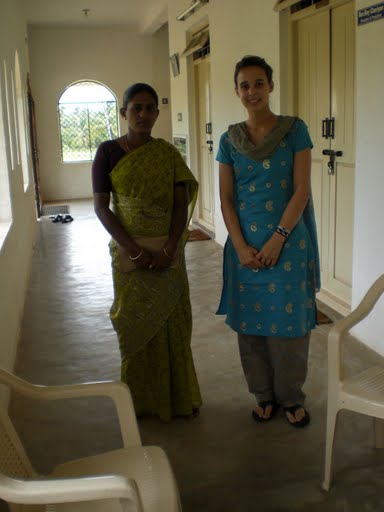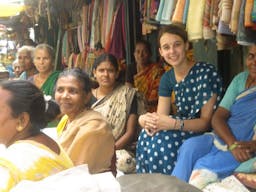WEI's First Widow Meeting
Jan 21, 2015
Story


Yesterday was WEI's first meeting with a widow. She lives in a local village and came to the campus where I stay to meet with me and provide answers for my research. She was a tiny young looking Hindu girl; I would have never guessed she had lived through what I would soon hear about. You can tell Hindu women because they often wear a bindi (the dot on their forehead), gold earrings and a gold chain around their neck (this is a symbol they are married, sometimes they part their hair in the middle and there is a dot where it is parted to symbolize this as well). I knew she was the widow I was meeting with when she walked up because she was not wearing a gold chain around her neck. She wore a green saree with purple flowers and a purple top underneath. Her hair was pulled back in a low ponytail which accentuated the petite features of her face (high cheek bones, tiny nose, and small rounded chin), she looked so young. When walking in the cities it is much easier to tell those people who are desperately poor but out in the villages it seems more difficult to discern who is poorer than anyone else. I am not sure if those in the cities live harder lives or are truly poorer than those living out in the villages. She brought two envelopes with her filled with documents. As we talked she would pull out the appropriate document to support what she was saying. When she first began to tell us about her husband committing suicide she pulled out the death certificate. Since I have arrived I have been waiting for that moment on trips like this that take the wind out of you....and this was mine. I could not believe that I was sitting with a woman that I had flown half way around the world to meet and was now holding her husband's death certificate. She was so strong and composed as she told us that he had been a heavy drinker and had taken on two loans equal to RP 150,000 that he could not pay back at the time of his suicide. While telling us this she pulled out bank books with payment dates, penalties, and interest payments they had made. I could not believe that she allowed me to thumb through everything and study the whole financial history that lead to her husband's death. She told me that she was unaware at this time if she was on the debt forgiveness list at the bank because she had not had time to go and check (Many banks in suicide districts are forgiving all debt carried by the husband). The widow was twenty four at the time he killed himself and their oldest child. She not only lost her husband but he took one of their three children with him when he committed suicide in 2001. She told us that after this happened that she was inconsolable for a year and wouldn't really talk to anyone. She went on to tell me that she is the sole supporter of her family (herself and her two surviving children). One of her daughters walks 6km to school everyday because the bus is expensive and no more efficient than walking. Her other child goes to a local school near our village. I asked her what she would do if she could start a business and she immediately replied "I could never run my own business." I told her that she already did...she told us earlier that she has a milk cow and works day labor to support herself. I said "could you milk more than one cow and sell it to support yourself?" She went on to tell me that you must rotate cows so that they do not dry up and that she could care for three at one time by herself. She cannot afford to feed more cows and pay someone to help her. She believes that with three cows she would work minimal day labor to be able to save some money. Through talking with her further I found that each cow costs RP 15000 or about $375 and to feed each cow for a month is about RP 2500 or about $63. Cows are sold weekly in her village right down the street from her house. I then asked her if I could take pictures with her she agreed and invited us to take pictures of her at her house with her cow and children. I will be going to take these pictures this evening.
I won't lie, I wanted more than anything to go buy her a cow right then and there. Before interviewing I made sure that this woman would be willing to accept monetary support (some will not accept any help). She was there to help me obtain information and had no idea at this point that I will be fundraising to help her be self sufficient. I think this is a very important aspect of this process...those people who are willing to help others when they appear to be helpless themselves are people who really deserve this money. I think the bigger lesson here is that people who may appear to have nothing to give can really help us in our lives in bigger ways than those who appear to have everything.
I do not write about this meeting to get people's sympathy for the poor women I am working with. I write to tell you about the things that you may not have seen or ever see and the struggles that many people go through without us even knowing. I think the story of this woman's strength to go on and raise two children is amazing and there is a lot to be learned here...
On another note I would like to thank everyone who is writing me messages about the blog and newspaper article. It has become very difficult to reply to everyone but please keep writing your support means the world to me. A special thanks to family, friends, doctors at Mayo hospital and the vanpool ladies. Keep the questions coming ladies!
Now to answer some of the questions I am behind on….Most of the signs are in the state’s language and English. I believe the English is from the British colonization and it is important to note that each state of India speaks at least one language of its own! Lots to learn! My address is a P.O. Box because some people in the city 30km away don’t even know the name of our village. This is because there are soo soo many small villages all over the place…it would be equivalent to asking someone in Mesa about a residential development in Scottsdale. People hand wash their clothes in buckets with soap and then hang them on the line to dry. I sent my clothes to be washed two days ago but with the rain they haven’t dried yet! I guess the ones I have left might be stinking from wearing them a few times before I get my others back. There are no girls living on this campus because there are not separate facilities for them. In India it is not appropriate for the sexes “to mix” even at a young age. There are women’s sports but they are not broadcast on TV… they include cricket, field hockey, soccer etc. After I leave the orphanage I will be living in churches and temples in small rural villages. I am still amazed they get electricity to these places, it is truly amazing! I did not start my travels in somewhere like Europe mostly because I wouldn’t be able to do my work there…more importantly you have to push yourself outside your comfort zone when you are young and do not have the attachments that come later in life.
Please keep the questions and comments coming! New pictures have been posted online at http://picasaweb.google.com/Heather.Lee.Murphy/Kerala .
India lesson of the day: Caution! Make sure and tie your churridar scarf around you when riding a motorbike.




